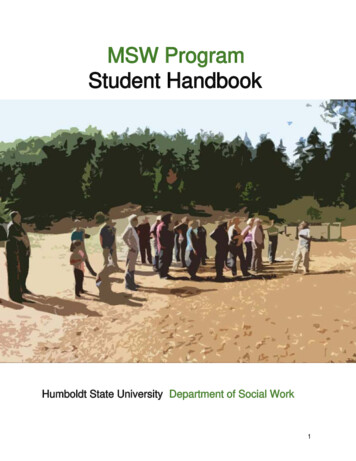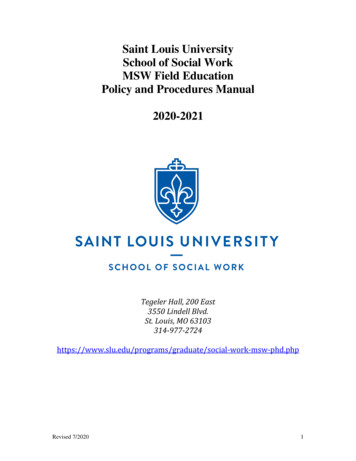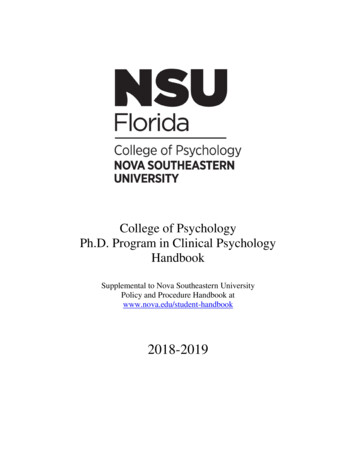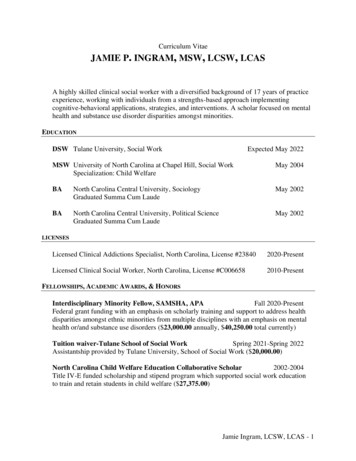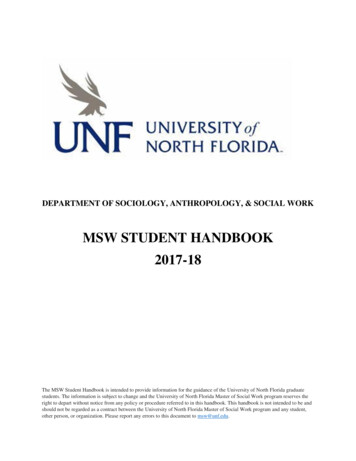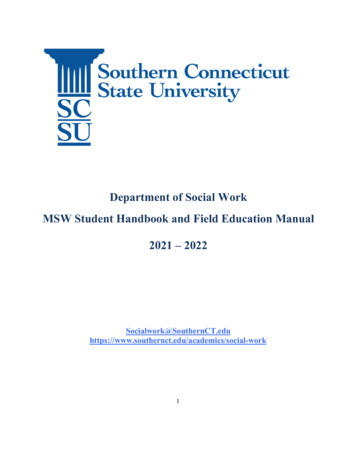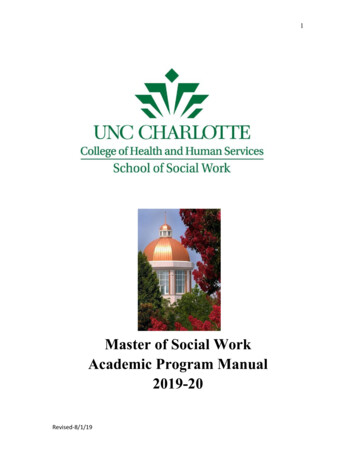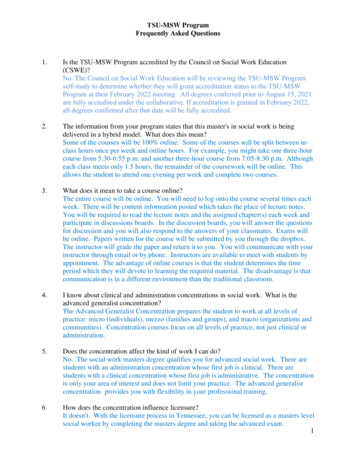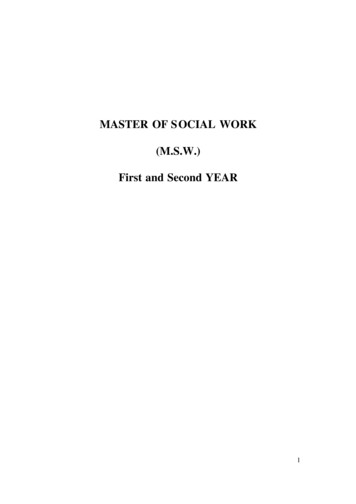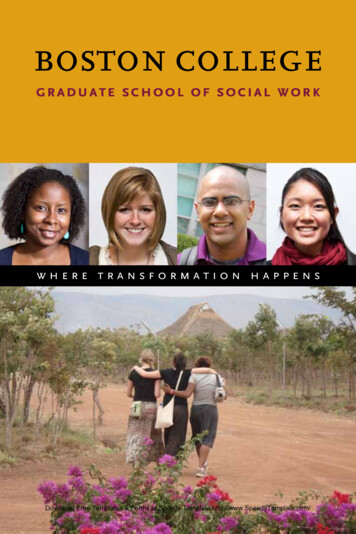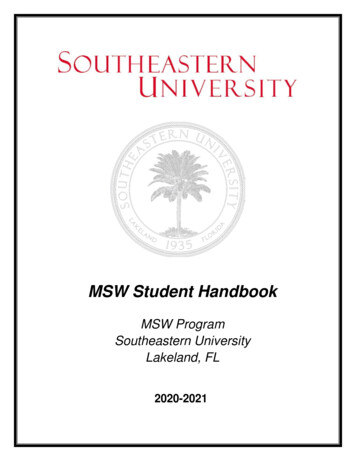
Transcription
MSW Student HandbookMSW ProgramSoutheastern UniversityLakeland, FL2020-2021
ContentsWelcome . 1MSW Program Overview . 2MSW Program Mission Statement and Goals . 2MSW Curriculum . 3Generalist Social Work Practice Definition . 3Generalist Social Work Competencies & Behaviors . 4Clinical Social Work Practice Definition .6Clinical Social Work Competencies & Behaviors . 7Traditional MSW Program .8Advanced Standing MSW Program . 10Course Delivery .11MSW Program Accreditation . 12MSW Program Policies. 13Academic & Professional Advising Policy . 14Academic & Professional Performance and Academic Progress Policy (includingStudent Excellence Standards) . 15Academic Integrity Policy . 21Admissions Policy . 22Appeals & Grievance Policy . 28Attendance & Participation Policy. 30Life-Work Experience Credit Policy . 31Nondiscrimination Policy . 32Social Media & Technology Policy . 33Student Rights & Responsibilities Policy . 36Student Organizations . 38Transfer of Credit Policy . 41Appendices . 42Appendix A Course Descriptions . 43Appendix B Student Development Plan . 47
WelcomeWelcome to the MSW Program! Social work is an exciting profession and provides a diverseselection of career opportunities.The social work profession historically worked with the poor, advocated for social justice,and empowered communities to create social change. Throughout history, social workersresponded to emerging social problems by mobilizing people to care for each other. Today,our graduate degree in social work prepares students to use professional knowledge, values,and skills to help alleviate a variety of social problems and advocate for social, economic,and environmental justice through clinical social work practice. At Southeastern University,your social work education includes courses about what social workers know (knowledge),who they are (values), what they can do (skills), how they think (critical processing), andwhat they feel (affective processing).In order to promote a successful learning environment, the MSW Student Handbook servesas a guide for completing a Master of Social Work (MSW) degree at SoutheasternUniversity. Its purpose is: To provide information regarding the mission, goals, and curriculum of theMSW Program To articulate the program requirements, policies, procedures, and practices To inform students of their rights and responsibilitiesThe handbook should be used with the MSW Field Manual and the Graduate Catalogdeveloped by the university. Together, these references provide supporting informationabout the policies, procedures, expectations, and curriculum for students pursuing a MSWdegree at Southeastern University. If you have questions, please ask. Social work facultyare happy to help.Along with the social work faculty, we wish you all the best in your educational journey.Jessica Felix-Jager de Weaver, DSW, MSW, CWLCJessica Félix-Jäger de Weaver, DSW, MSW, CWLCMSW Program Director, Professor Department of Social WorkO (863) 667-5393 C (321) 501-9970E jfelixjagerweaver@seu.edu1 Page
MSW Program OverviewThe Master in Social Work (MSW) Program offers graduate education preparing socialworkers to enter the workplace as clinical social work practitioners. In order to ensure aquality social work education, the program mission, goals, and curriculum align with theCouncil on Social Work Education (CSWE) competencies and practice behaviors. Thefollowing section articulates the program mission, goals, and curriculum in relation to theCSWE competencies and practices.MSW Program Mission Statement and GoalsPlacing an emphasis on the core values of the social work profession and building uponthe foundation of generalist practice, the mission of the Master of Social Work Program atSoutheastern University is to equip students to become competent clinical social workpractitioners who will enhance the quality of life in their local communities and beyond bymodeling Christ’s example of demonstrating love, grace, compassion, and respect to diverseclients across a variety of practice settings.The program goals are:1. To equip students with the knowledge, values, skills, behaviors, cognitive processes,and affective processes necessary to engage in competent social work practice withdiverse individuals, families, groups, organizations, and communities.2. To promote a strengths-based perspective that fosters a commitment to the valuesand ethics of the social work profession including the core values of social justice, theimportance of human relationships and human rights, the dignity and worth ofeach individual, integrity, and professional competence.3. To create a learning environment that fosters critical thinking and enables students toapply evidence-based theoretical frameworks and interventions in clinical practice.4. To prepare students to apply a person-in-environment perspective in social workpractice with individuals, families, groups, organizations, and communities.5. To promote advocacy for human rights and social and economic justice, especiallyamong oppressed populations.6. To actively demonstrate the ethical integration of faith and practice by applying Christ’steachings of service, respect for all humans, appreciation of cultural diversity,compassion, gentleness, grace, and love in social work practice.2 Page
MSW CurriculumMSW students complete their graduate social work education through one of two options:Traditional MSW Program or Advanced Standing MSW Program. The Traditional MSWProgram is for students without a CSWE-accredited, undergraduate degree in social work.Their curriculum requires courses in generalist and clinical social work practice. TheAdvanced Standing MSW Program is for students with a CSWE-accredited, undergraduatedegree in social work. Similar to the second year traditional students, their courseworkfocuses on clinical social work. The following provides definitions of generalist and clinicalsocial work practice, identifies the CSWE competencies and behaviors associated with eacharea of practice, and describes the traditional and advanced standing curricula.Generalist Social Work Practice DefinitionGeneralist practice requires collaboration with individuals, families, groups, organizations,and communities. In order to help others, generalist social workers use a variety of practiceroles. They may work as an advocate, broker/linker, case manager, community developer,educational trainer, fundraiser, grant writer, program planner, researcher, social changeactivist, or volunteer coordinator. In order to fulfill the professional responsibilities related toeach role, generalist social workers use their skills to engage, assess, plan, intervene, andevaluate their practice with their clients. Therefore, generalist social workers use anintentional helping process with multiple roles.The person-in-environment framework and a strengths-based practice model arefoundational to generalist practice. Social workers assess the internal and externalstrengths, challenges, and needs of people and their social environments. In order tointervene, they apply evidence-informed knowledge while building on strengths andresiliency of their clients and social systems. Hence, generalist social workers help peopleachieve their goals through the application of strengths-based, research-supportedinterventions.The relationship between practice, research, policy, and ethics directs the decision-makingprocesses of generalist practitioners. Research provides foundational knowledge, andpractice produces new research questions. The NASW Code of Ethics (2017) presentsguidelines for ethical, responsible social work practice. Organizational and social policiesestablish the parameters of practice. Therefore, generalist social workers value the processwhereby research, policy, and ethics inform their practice.Generalist social workers are professionals who are committed to helping people reach theirfullest potential. They value service, social justice, the dignity and worth of all people, theimportance of human relationships, integrity, and competence. Their practice demonstratesrespect for all people regardless of differences, empowerment of human and social wellbeing, and advocacy for social, economic, and environmental justice.ReferencesKirst-Ashman, K.K., & Hull, Jr., G.H. (2017). Understanding generalist practice (8th ed.). Boston, MA: Cengage Learning.Miley, K. K., O’Melia, M., & Miley, K. K. (2013). Generalist social work practice: An empowering approach (8th ed.). Boston, MA: PearsonEducation, Inc.National Association of Social Workers (NASW). (2017). NASW code of Code-ofEthics/Code-of-Ethics-English3 Page
Generalist Social Work Competencies & BehaviorsThe generalist social work definition aligns with the competencies set forth in the 2015Educational Policy and Accreditation Standards (EPAS) from the Council on Social WorkEducation (CSWE). Based on these competencies, the MSW Program developed essentialbehaviors related to generalist knowledge, values, skills, and cognitive and affectiveprocesses. In order to complete the generalist curriculum, students must demonstrate thefollowing:Competency 1 – Demonstrate Ethical and Professional Behavior#1. Make ethical decisions by applying the standards of the NASW Code of Ethics, relevant lawsand regulations, models for ethical decision-making, ethical conduct of research, and additionalcodes of ethics as appropriate to context.#2. Use reflection and self-regulation to manage personal values and maintain professionalism inpractice situations.#3. Demonstrate professional demeanor in behavior; appearance; and oral, written, and electroniccommunication.#4. Use technology ethically and appropriately to facilitate practice outcomes.#5. Use supervision and consultation to guide professional judgment and behavior.Competency 2 – Engage Diversity and Difference in Practice#6. Apply and communicate understanding of the importance of diversity and difference in shapinglife experiences in practice at the micro, mezzo, and macro levels.#7. Present themselves as learners and engage clients and constituencies as experts of their ownexperiences.#8. Apply self-awareness and self-regulation to manage the influence of personal biases andvalues in working with diverse clients and constituencies.Competency 3 – Advance Human Rights and Social, Economic, and Environmental Justice#9. Apply their understanding of social, economic, and environmental justice to advocate forhuman rights at the individual and system levels.#10. Engage in practices that advance social, economic, and environmental justice.Competency 4 – Engage in Practice-informed Research and Research-informed Practice#11. Use practice experience and theory to inform scientific inquiry and research.#12. Apply critical thinking to engage in analysis of quantitative and qualitative research methodsand research findings.#13. Use and translate research evidence to inform and improve practice, policy, and servicedelivery.#14. Use research methods to evaluate clinical practice effectiveness and/or agency outcomes.Competency 5 – Engage in Policy Practice#15. Identify social policy at the local, state, and federal level that impacts well-being, servicedelivery, and access to social services.#16. Assess how social welfare and economic policies impact the delivery of and access to socialservices.#17. Apply critical thinking to analyze, formulate, and advocate for policies that advance humanrights and social, economic, and environmental justice.4 Page
Competency 6 – Engage with Individuals, Families, Groups, Organizations, and Communities#18. Apply knowledge of human behavior and the social environment, person-in-environment, andother multidisciplinary theoretical frameworks to engage with clients and constituencies#19. Use empathy, reflection, and interpersonal skills to effectively engage with diverse clients andconstituencies.Competency 7 – Assess Individuals, Families, Groups, Organizations, and Communities#20. Collect and organize data, and apply critical thinking to interpret information from clients andconstituencies.#21. Apply knowledge of human behavior and the social environment, person-in-environment, andother multidisciplinary theoretical frameworks in the analysis of assessment data from clientsand constituencies.#22. Develop mutually agreed-on intervention goals and objectives based on the criticalassessment of strengths, needs, and challenges within clients and constituencies.#23. Select appropriate intervention strategies based on the assessment, research knowledge, andvalues and preferences of clients and constituencies.Competency 8 – Intervene with Individuals, Families, Groups, Organizations, and Communities#24. Critically choose and implement interventions to achieve practice goals and enhancecapacities of clients and constituencies.#25. Apply knowledge of human behavior and the social environment, person-in-environment, andother multidisciplinary theoretical frameworks in interventions with clients and constituencies.#26. Use inter-professional collaboration as appropriate to achieve beneficial practice outcomes.#27. Negotiate, mediate, and advocate with and on behalf of diverse clients and constituencies.#28. Facilitate effective transitions and endings that advance mutually agreed-on goals.Competency 9 – Evaluate Practice with Individuals, Families, Groups, Organizations, andCommunities#29. Select and use appropriate methods for evaluation of outcomes.#30. Apply knowledge of human behavior and the social environment, person-in-environment, andother multidisciplinary theoretical frameworks in the evaluation of outcomes.#31. Critically analyze, monitor, and evaluate intervention and program processes and outcomes.#32. Apply evaluation findings to improve practice effectiveness at the micro, mezzo, and macrolevels.Competency 10 – Integrate Faith and Social Work Practice in a Way that Embraces Diversity andis Consistent with both the Christian Faith and the NASW Code of Ethics#33. Understand and work effectively with the religious, faith, and spirituality dimensions of personsand communities.#34. Understand and work effectively within the context of the practice setting in regards to faithand spirituality.#35. Draw from one’s own faith and spirituality to practice self-care and to empower one’s ability toengage in effective social work practice.ReferenceCouncil on Social Work Education (CSWE). (2015). 2015 Education Policy and Accreditation Standards sary.pdf.aspx5 Page
Clinical Social Work Practice DefinitionClinical social work builds on the knowledge and skills of generalist practice. In that, aclinical social worker applies the strengths and person-and-environment perspectives tothe holistic assessment of individuals, families, couples, and groups. In addition, a clinicalpractitioner recognizes the value of referring clients to community services and effectivelycollaborates with other professionals to enable and advocate for clients to receive thoseservices.The goal of clinical social work practice is to facilitate cognitive, affective, and behavioralchanges consistent with treatment goals. Social workers in clinical settings useassessment, diagnostic, prevention, and intervention skills in order to provide counseling,case management, consultation, client-center advocacy, and psychosocial education.Clinical knowledge develops competence in applying evidence-informed interventions suchas trauma-informed, cognitive behavior, crisis prevention, substance abuse, solutionfocused, and family systems treatment models. Therefore, a clinical social worker appliesspecialized knowledge and skills in order to promote human and social well-being of theirclients.Clinical social work is adaptable to a variety of client-centered settings. Community mentalhealth centers, hospitals, substance use treatment, recovery programs, domestic violenceshelters, youth services centers, schools, primary health care centers, child welfareagencies, aging services, employee assistance programs, law enforcement, probation, andprivate practice settings commonly employee clinical social workers. Ultimately, clinicalsocial workers strive to offer their clients hope by empowering them to heal from lifesituations and challenges.ReferencesGrant, D. (2013). Clinical social work. In Encyclopedia of Social Work. doi:10.1093/acrefore/9780199975839.013.63National Association of Social Work (NASW). (2005). NASW standards for clinical social work in social work spx?fileticket YOg4qdefLBE%3d&portalid 0Regulations of Professions and Occupations, Title XXXII, Fl. Stat. §§ 491.003-7(a)–7(d). /Chapter491/All6 Page
Clinical Social Work Competencies & BehaviorsThe clinical social work definition aligns with the competencies set forth in the 2015 EducationalPolicy and Accreditation Standards (EPAS) from the Council on Social Work Education (CSWE).Based on these competencies, the MSW Program developed essential behaviors related to clinicalsocial work knowledge, values, skills, and cognitive and affective processes. In order to completethe clinical social work curriculum, students must demonstrate the following:Competency 1 – Demonstrate Ethical and Professional Behavior#35. Effectively manage professional boundaries in clinical practice.#36. Apply the NASW Code of Ethics and strategies of ethical-decision making to clinicalpractice and interpersonal interventions with clients.#37. Demonstrate professional use of self in clinical practice.#38. Identify professional strengths, limitations, and challenges in practice.Competency 2 – Engage Diversity and Difference in Practice#39. Research and apply knowledge of diverse client populations including the cultural,spiritual, and ethnic values and beliefs of clients to enhance well-being.#40. Demonstrate advanced insight into personal biases and values and their influence on theclient-worker relationship.#41. Apply cultural humility to clinical practice and extend dignity and respect to all clients.Competency 3 – Advance Human Rights and Social, Economic, and Environmental Justice#42. Apply knowledge of the effects of oppression, discrimination, and historical trauma onclients to guide clinical assessment and intervention.Competency 4 – Engage in Practice-informed Research and Research-informed Practice#43. Use the evidence-based process to identify and apply effective clinical practiceinterventions for clients.#44. Use research methods to evaluate clinical practice effectiveness and/or agencyoutcomes.Competency 5 – Engage in Policy Practice#45. Advocate for social policies and/or agency policies that will enhance client well-being,service delivery, and/or access to social services.Competency 6 – Engage with Individuals, Families, Groups, Organizations, and Communities#46. Apply a strengths-based, person-in-environment perspective to establish rapport andmaintain therapeutic relationships with clients.#47. Attend to the interpersonal dynamics and contextual factors that both strengthen andpotentially weaken the therapeutic worker-client alliance.#48. Establish worker-client relationships that promote client participation in the establishmentof mutually agreed upon treatment goals and objectives.Competency 7 – Assess Individuals, Families, Groups, Organizations, and Communities#49. Utilize multidimensional bio-psycho-social-spiritual assessment forms and tools.#50. Assess client readiness for change.#51. As appropriate, apply differential and multi-axial diagnoses.Competency 8 – Intervene with Individuals, Families, Groups, Organizations, and Communities#52. Critically evaluate, select, and apply evidence-based practice interventions.7 Page
#53. Implement treatment plans and/or contracts with clients to meet mutually agreed upongoals.#54. Demonstrate use of appropriate clinical interventions for a range of presenting concerns.#55. Modify clinical interventions as necessary throughout the treatment process.Competency 9 – Evaluate Practice with Individuals, Families, Groups, Organizations, andCommunities#56. Develop evaluation plans to monitor client progress and measure the efficacy of clinicalinterventions.Competency 10 – Integrate Faith and Social Work Practice in a Way that Embraces Diversityand is Consistent with both the Christian Faith and the NASW Code of Ethics#57. Include an examination of client’s spirituality in the assessment process.#58. As appropriate, utilize client’s own faith, religious practice, and/or spirituality as apotential coping mechanism.ReferenceCouncil on Social Work Education (CSWE). (2015). 2015 Education Policy and Accreditation Standards sary.pdf.aspxTraditional MSW Program PlanIn order to graduate with an MSW degree, the traditional program plan requires 65 credithours. A traditional student has an undergraduate degree in any field or discipline.Therefore, the first year of the traditional program provides a generalist social workeducation. At the end of the first year, traditional students join the advanced standingstudents and continue their education in the specialized area of clinical social work practice.The required course sequence for the traditional program plan is in the following list andtable. Course descriptions are available in Appendix A.Fall- First Year SOWK 5021- Academic Writing at the Graduate Level (1 hour) SOWK 5043- Foundations of Social Work Practice (3 hours) SOWK 5073- Interviewing and Helping Skills (3 hours) SOWK 5013- Generalist Practice with Individuals and Families (3 hours) SOWK 5023- Human Behavior and the Social Environment (3 hours)Spring- First Year SOWK 5053- Engaging Diversity and Difference in Practice (3 hours) SOWK 5083- Social Welfare Policy (3 hours) SOWK 5063- Methods of Social Work Research (3 hours) SOWK 5033- Generalist Practice with Groups, Communities, and Organizations (3hours)Summer- First Year SOWK 5014 Field Experience/Seminar I (4 hours) SOWK 5024 Field Experience/Seminar II (4 hours)Fall -Second Year SOWK 6014- Field Experience/Seminar III (4 hours)8 Page
SOWK 6043- Psychopathology (3 hours)SOWK 6013- Advanced Clinical Practice with Individuals (3 hours)SOWK 6023- Advanced Clinical Practice with Couples, Children, and Families (3 hours)SOWK 6053- Trauma Informed Clinical Practice (3 hours)Spring- Second Year SOWK 6024- Field Experience/Seminar IV (4 hours) SOWK 6063- Evaluation of Social Work Practice (3 hours) SOWK 6033- Advanced Clinical Practice with Groups (3 hours) SOWK 6073- Social Work Administration and Leadership (3 hours) SOWK 5XX3- Clinical Practice Elective (3 hours)Traditional MSW Program PlanFirst Year in Traditional MSW Program PlanFall SemesterFallSpringTerm ASemesterSemesterTerm BTerm ASOWK 5021SOWK 5013 SOWK 5053SOWK 5043SOWK 5023 SOWK 5083SOWK 5073SpringSemesterTerm BSOWK 5063SOWK 5033SummerTerm ASOWK 5014(25 – 28hours in fieldagency)SummerTerm BSOWK 5024(25 – 28hours in fieldagency)Second Year in Traditional MSW Program PlanFallSpringSpringFall SemesterSemesterSemester TermSemesterTerm ATerm BATerm BSOWK 6014SOWK 6024(16 - 18 hours in field agency)(16 - 18 hours in field agency)SOWK 6043SOWK 6013SOWK 6023SOWK 6053SOWK 6063SOWK 6033SOWK 6073SOWK 5XX3Notes about Field Courses SOWK 5014 Field Experience and Seminar I (4 credit hours) and SOWK 5024 FieldExperience and Seminar II (4 credit hours) occur as a block placement during the firstsummer of enrollment in the program. Students accrue 400 clock hours over 16 weeks,which is approximately 25 to 28 hours a week in the field agency. Field hours take placeduring the hours the agency is open.SOWK 6014 Field Experience and Seminar III (4 credit hours) and SOWK 6024 FieldExperience and Seminar IV (4 credit hours) happen concurrently with other course workin the fall and spring semesters. Students accumulate 500 clock hours over bothsemesters. Each semester is 16 weeks; therefore, students spend approximately 16 –18 hours a week in the field agency. Field hours take place during the hours the agencyis open.Note: For additional details about the field experience, see the MSW Field Manual.9 Page
Advanced Standing MSW Program PlanIn order to graduate with an MSW degree, this option requires 32-33 credit hours. Anadvanced standing student earned an undergraduate degree in social work from a CSWEaccredited program or has a degree recognized by the International Social Work DegreeRecognition and Evaluation Services of CSWE. Advanced standing students join thesecond-year traditional students in order to complete their graduate work in the specializedarea of clinical social work practice. The required course sequence for the advancedstanding program is in the following list and table. Course descriptions are available inAppendix A.Fall SOWK 5021- Academic Writing at the Graduate Level - 1 hour (only required foradvanced-standing students who completed baccalaureate degrees more than 5 yearsprior to admission or are provisionally admitted to the Advanced Standing MSW Programwith this course requirement) SOWK 6014- Field Experience/Seminar III (4 hours) SOWK 6043- Psychopathology (3 hours) SOWK 6013- Advanced Clinical Practice with Individuals (3 hours) SOWK 6023- Advanced Clinical Practice with Couples, Children, and Families (3 hours) SOWK 6053- Trauma Informed Clinical Practice (3 hours)Spring SOWK 6024- Field Experience/Seminar IV (4 hours) SOWK 6063- Evaluation of Social Work Practice (3 hours) SOWK 6033- Advanced Clinical Practice with Groups (3 hours) SOWK 6073- Social Work Administration and Leadership (3 hours) SOWK 5XX3- Clinical Practice Elective (3 hours)10 P a g e
Advanced Standing MSW Program PlanFirst Year in Advanced Standing MSW ProgramFallSpringSpringFall SemesterSemesterSemesterSemesterTerm ATerm BTerm ATerm BSOWK 6014SOWK 6024(16 - 18 hours in field agency)(16 - 18 hours in field agency)SOWK 6043SOWK 6013SOWK 6023SOWK 6053SOWK 6063SOWK 6033SOWK 6073SOWK 5XX3Notes about Field Courses SOWK 6014 Field Experience and Seminar III (4 credit hours) and SOWK 6024 FieldExperience and Seminar IV (4 credit hours) happen concurrently with other course workin the fall and spring semesters. Students accumulate 500 clock hours over bothsemesters. Each semester is 16 weeks; therefore, students spend approximately 16 –18 hours a week in the field agency. Field hours take place during the hours the agencyis open. For more details regarding the field experience, see the MSW Field Manual.Course DeliveryAll social work courses are 8-week terms. The delivery method is face-to-face in a classroomon campus. The 4-hour classes meet on two evenings a week. During the fall semester, twocourses occur during the first 8 weeks while two additional courses happen in the last 8weeks. The spring semester courses repeat the same pattern. No online courses areavailable.In addition to in-class courses, students complete their field experience in community-basedagencies. The students in the Traditional MSW Program complete two 8-week field coursesduring the first summer of their enrollment in the program. For the specialized curriculum,students complete one field practicum course during the fall semester and another duringthe spring
MSW students complete their graduate social work education through one of twooptions : Traditional MSW Program or Advanced Standing MSW Program. The Traditional MSW Program is for students without a CSWE-accredited, undergraduate degree in social work. Their curriculum requires courses in generalist and clinical social work practice. The

